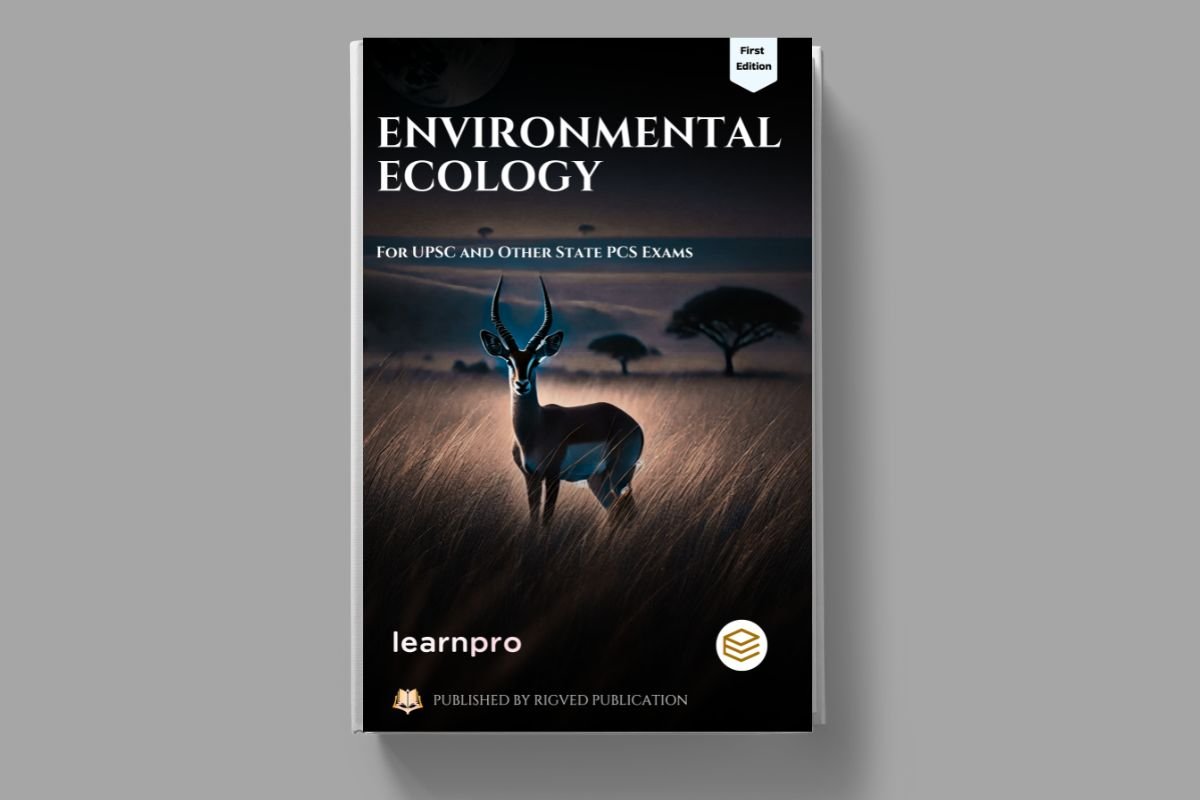Environment Notes for UPSC
Original price was: ₹399.00.₹259.00Current price is: ₹259.00.
🔑 Key Features :
🌿 Covers ecosystems, biodiversity, and conservation methods.
☁️ Detailed notes on climate change, global warming, and India’s climate policies.
📜 Includes environmental laws, policies, and constitutional provisions.
📝 Provides Prelims MCQs and Mains answer writing support.
📈 Features infographics and mind maps for quick revision.
🌐 Updated with the latest environmental current affairs.
🔍 100% UPSC-focused with concise, exam-relevant content.
Guaranteed Safe Checkout
- Satisfaction Guaranteed
- No Hassle Refunds
- Secure Payments
Description
-
Introduction to Environment and Ecology
- Definition of Environment and Ecology
- Components of the Environment (Biotic and Abiotic)
- Levels of Ecological Organization (Organism, Population, Community, Ecosystem, Biosphere)
- Scope and Importance of Environmental Studies
-
Ecosystem and Its Components
- Structure and Function of Ecosystems
- Types of Ecosystems: Terrestrial and Aquatic
- Food Chains, Food Webs, and Ecological Pyramids
- Energy Flow in Ecosystems (10% Law, Trophic Levels)
- Ecological Succession: Types and Examples
- Biogeochemical Cycles: Water, Carbon, Nitrogen, Phosphorus, and Sulfur Cycles
-
Biodiversity and Conservation
- Definition and Types of Biodiversity (Genetic, Species, Ecosystem)
- Biodiversity Hotspots in India and the World
- Importance and Threats to Biodiversity
- Conservation Methods: In-situ and Ex-situ
- National Parks, Wildlife Sanctuaries, Biosphere Reserves
- Ramsar Wetlands, UNESCO World Heritage Sites related to Biodiversity
-
Environmental Pollution and Degradation
- Types of Pollution: Air, Water, Soil, Noise, and Thermal Pollution
- Causes and Effects of Pollution
- Control Measures and Technologies
- Solid Waste Management: Types, Disposal Methods, and Challenges
- E-waste, Plastic Waste, and Biomedical Waste Management
- Pollution Control Acts and Regulations in India
-
Climate Change and Global Warming
- Greenhouse Effect and Greenhouse Gases
- Causes and Effects of Climate Change
- Impact of Climate Change on Biodiversity, Agriculture, Health, and Livelihood
- Ozone Layer Depletion and Montreal Protocol
- International Efforts: UNFCCC, Kyoto Protocol, Paris Agreement
- India’s Initiatives to Combat Climate Change: National Action Plan on Climate Change (NAPCC) and State Action Plans (SAPCC)
-
Environmental Governance in India
- Constitutional Provisions Related to Environment (Article 48A, 51A(g))
- Important Environmental Laws: Environment Protection Act (1986), Air Act (1981), Water Act (1974), Forest Conservation Act (1980)
- National Green Tribunal (NGT) and its Role
- Environmental Impact Assessment (EIA)
- Environmental Clearance Processes
- Public Participation and Role of NGOs in Environmental Governance
-
Natural Resources and Their Management
- Types of Natural Resources: Renewable and Non-Renewable
- Sustainable Resource Management
- Forest Resources: Types, Importance, and Depletion
- Water Resources: Utilization, Conservation, and Disputes
- Mineral and Energy Resources: Conventional and Non-conventional Energy Sources
- Soil and Land Resources: Degradation and Conservation Techniques
-
Environmental Organizations and Conventions
- International Environmental Organizations: UNEP, IPCC, IUCN, WWF
- Major International Environmental Conventions and Protocols:
- Stockholm Conference (1972)
- Rio Earth Summit (1992)
- Convention on Biological Diversity (CBD)
- CITES (Convention on International Trade in Endangered Species)
- Basel, Rotterdam, and Stockholm Conventions
- Minamata Convention on Mercury
- India’s Role in Global Environmental Governance
-
Sustainable Development and Environmental Ethics
- Concept of Sustainable Development
- Sustainable Development Goals (SDGs)
- Principles of Environmental Ethics
- Ecological Footprint and Carbon Footprint
- Green Economy and Circular Economy
- Role of Technology in Sustainable Development
-
Disaster Management and Environmental Hazards
- Types of Natural and Man-made Disasters: Earthquakes, Floods, Cyclones, Landslides, Nuclear Disasters
- Disaster Management Cycle: Mitigation, Preparedness, Response, and Recovery
- National Disaster Management Authority (NDMA) and Its Role
- Early Warning Systems and Technologies
- Environmental Impact of Disasters and Recovery Measures
-
Environmental Movements in India
- Chipko Movement, Narmada Bachao Andolan, Silent Valley Movement
- Appiko Movement, Save Western Ghats Movement
- Role of Grassroots Movements in Environmental Conservation
- Environmental Activists and their Contributions
-
Current Environmental Issues and Government Initiatives
- Recent Environmental Policies and Schemes:
- National Electric Mobility Mission Plan
- FASTER Adoption and Manufacturing of Hybrid and Electric Vehicles (FAME)
- Unnat Jyoti by Affordable LEDs for All (UJALA)
- Pradhan Mantri Ujjwala Yojana
- Swachh Bharat Mission
- Urban Environmental Issues: Waste Management, Air Quality (AQI), and Water Scarcity
- Emerging Environmental Technologies: Renewable Energy, Green Hydrogen, Biofuels
- Environmental Performance Index (EPI) and India’s Ranking
- Recent Environmental Policies and Schemes:
-
Environmental Impact on Health
- Air and Water Pollution-Related Diseases
- Climate Change and Vector-Borne Diseases
- Role of WHO in Environmental Health
- Environmental Health Indicators
-
Agriculture and Environment
- Impact of Agriculture on Environment
- Organic Farming and Sustainable Agriculture Practices
- Green Revolution and Its Environmental Consequences
- Integrated Pest Management (IPM) and Sustainable Land Use
-
Waste Management and Circular Economy
- Types of Waste: Solid, Liquid, Hazardous, and E-waste
- Waste-to-Energy Technologies
- Plastic Waste Management Rules, 2016
- Circular Economy Models and Success Stories
-
Forest and Wildlife Resources
- Types of Forests in India: Tropical, Deciduous, Mangroves, etc.
- Forest Policy of India
- Joint Forest Management (JFM)
- Wildlife Protection Act, 1972 and Amendments
- Project Tiger, Project Elephant, and Other Wildlife Conservation Projects
-
Water Resources and Wetland Conservation
- Major Rivers and Water Bodies of India
- Issues Related to Groundwater Depletion
- National Water Policy
- Wetland Conservation and Ramsar Sites in India
- Interlinking of Rivers: Pros and Cons
-
Energy and Environment
- Conventional and Non-Conventional Energy Resources
- Solar, Wind, Hydro, Biomass, and Geothermal Energy
- National Solar Mission and India’s Renewable Energy Targets
- Energy Efficiency and Conservation Measures
- Challenges in Energy Transition and Energy Security
-
Urbanization and Environmental Challenges
- Urban Sprawl and Its Impact on Environment
- Smart Cities Mission and Sustainable Urban Development
- Urban Flooding and Waste Management
- Air Quality Management in Urban Areas
-
International Environmental Agreements and India’s Commitments
- India’s INDCs (Intended Nationally Determined Contributions)
- Role of India in COP Conferences
- International Solar Alliance (ISA) and India’s Leadership
- Global Environmental Agreements and Their Impact on India


Reviews
There are no reviews yet.